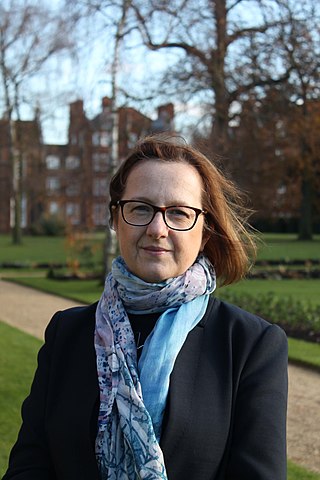Related Research Articles
The following outline is provided as an overview and topical guide to linguistics:
Semantics is the study of reference, meaning, or truth. The term can be used to refer to subfields of several distinct disciplines, including philosophy, linguistics and computer science.
In linguistics and related fields, pragmatics is the study of how context contributes to meaning. The field of study evaluates how human language is utilized in social interactions, as well as the relationship between the interpreter and the interpreted. Linguists who specialize in pragmatics are called pragmaticians. The field has been represented since 1986 by the International Pragmatics Association (IPrA).
Robert D. Van Valin Jr. is an American linguist and the principal researcher behind the development of Role and Reference Grammar, a functional theory of grammar encompassing syntax, semantics, and discourse pragmatics. His 1997 book Syntax: structure, meaning and function is an attempt to provide a model for syntactic analysis which is just as relevant for languages like Dyirbal and Lakhota as it is for more commonly studied Indo-European languages.

The Linguistic Society of America (LSA) is a learned society for the field of linguistics. Founded in New York City in 1924, the LSA works to promote the scientific study of language. The society publishes three scholarly journals: Language, the open access journal Semantics and Pragmatics, and the open access journal Phonological Data & Analysis. Its annual meetings, held every winter, foster discussion amongst its members through the presentation of peer-reviewed research, as well as conducting official business of the society. Since 1928, the LSA has offered training to linguists through courses held at its biennial Linguistic Institutes held in the summer. The LSA and its 3,600 members work to raise awareness of linguistic issues with the public and contribute to policy debates on issues including bilingual education and the preservation of endangered languages.
In linguistics, coercion is a term applied to a process of reinterpretation triggered by a mismatch between the semantic properties of a selector and the semantic properties of the selected element. As Catalina Ramírez explains it, this phenomenon is called coercion because the process forces meaning into a lexical phrase where there is otherwise a discrepancy of the semantic aspects of the phrase. The term was first used in the semantic literature in 1988 by Marc Moens and Mark Steedman, who adopted it due to its "loose analogy with type-coercion in programming languages.” In his written framework of the generative lexicon, Pustejovsky (1995:111) defines coercion as "a semantic operation that converts an argument to the type which is expected by a function, where it would otherwise result in a type error."
Geoffrey Neil Leech FBA was a specialist in English language and linguistics. He was the author, co-author, or editor of more than 30 books and more than 120 published papers. His main academic interests were English grammar, corpus linguistics, stylistics, pragmatics, and semantics.
Linguistics is the scientific study of language. The modern study of linguistics is called a science because it entails the comprehensive, systematic, objective, and precise analysis of all aspects of language — cognitive, social, environmental, and biological, as well as structural. Before the 20th century, linguistics was not considered a scientific discipline.

Katarzyna Malgorzata "Kasia" Jaszczolt is a Polish and British linguist and philosopher. She is currently Professor of Linguistics and Philosophy of Language at the University of Cambridge, and Professorial Fellow at Newnham College, Cambridge.
Peter E. Hook is professor emeritus in the Department of Asian Languages and Cultures at the University of Michigan.
Claire Louise Bowern is a linguist who works with Australian Indigenous languages. She is currently a professor of linguistics at Yale University, and has a secondary appointment in the department of anthropology at Yale.
Barbara Kenyon Abbott is an American linguist. She earned her PhD in linguistics in 1976 at the University of California at Berkeley under the supervision of George Lakoff. From 1976 to 2006, she was a professor in the department of linguistics and Germanic, Slavic, Asian, and African languages at Michigan State University, with a joint appointment in philosophy. She is now a Professor Emerita.
Veneeta Dayal is an American linguist. She is currently the Dorothy R. Diebold Professor of Linguistics at Yale University.
Judith Tonhauser is a Professor of English Linguistics at the University of Stuttgart.
Lisa Christine Matthewson is Professor of Linguistics in the Department of Linguistics at University of British Columbia with specialties in pragmatics and semantics. She has also done significant work with semantic fieldwork and in the preservation and oral history of First Nations languages, especially St'át'imcets and Gitksan. Matthewson's appointment at UBC was notable because she was the first female full professor in the department's history.
Craige Roberts is an American linguist, known for her work on pragmatics and formal semantics.
Ceil (Kovac) Lucas is an American linguist and a professor emerita of Gallaudet University, best known for her research on American Sign Language.
M. Lynne Murphy is a professor of linguistics at the University of Sussex. She runs the blog Separated by a Common Language under the username Lynneguist and has written five books.
Seana Coulson is a cognitive scientist known for her research on the neurobiology of language and studies of how meaning is constructed in human language, including experimental pragmatics, concepts, semantics, and metaphors. She is a professor in the Cognitive Science department at University of California, San Diego, where her Brain and Cognition Laboratory focuses on the cognitive neuroscience of language and reasoning.
Louise McNally is a linguist and professor in the Department of Translation and Language Sciences at Universitat Pompeu Fabra (UPF). She researches semantics and pragmatics and their interfaces with syntax, in particular on areas including natural semantic ontology, scales, and reference.
References
- ↑ "Faculty". UT Austin Department of Linguistics. Retrieved 19 May 2023.
- 1 2 "Ashwini Deo - Curriculum Vitae". UT Austin Department of Linguistics. Retrieved 19 May 2023.
- ↑ "Ph.D. Alumni". Stanford Linguistics. Retrieved 19 May 2023.
- ↑ "Ashwini Deo". OSU Department of Linguistics. Retrieved 19 May 2023.
- ↑ "Editors". Natural Language & Linguistic Theory. Retrieved 19 May 2023.
- ↑ "Editorial Board". Transactions of the Philological Society. Retrieved 19 May 2023.
- ↑ "Editorial Team". semprag.org. Retrieved 19 May 2023.
- ↑ "Editorial Team". Journal of South Asian Linguistics. Retrieved 19 May 2023.
- ↑ "Award Abstract # 1248100". nsf.gov. Retrieved 19 May 2023.
- ↑ "Award Abstract # 1248100". nsf.gov. Retrieved 19 May 2023.
- ↑ "Award Abstract # 1248100". nsf.gov. Retrieved 19 May 2023.
- ↑ "LSA Fellows by Year of Induction" . Retrieved 19 May 2023.